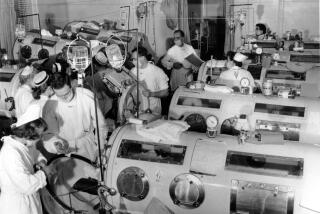Polio Survivor Has No Time to Feel Sorry for Herself
- Share via
Lee Seitz operates her wheelchair with her big toe.
She sleeps with a respirator to help her breathe. A ventilator pumps air through a mask to prevent her from choking.
Left a paraplegic by polio in 1951, Seitz, 65, depends on so much machinery for survival that she calls herself a bionic woman.
Nevertheless, the resilient Reseda grandmother heads the Polio Survivors Foundation, which last year spent $78,000 on motorized carts, wheelchairs, hospital beds and other equipment.
The efforts benefit people with post-polio syndrome. The recently recognized malady has produced fatigue, muscle weakness and pain in about 600,000 Americans up to 40 years after they contracted polio.
Although affected by the syndrome since 1985, in addition to the initial crippling she suffered from polio, Seitz refuses to get depressed.
“Maybe it’s because I’m as independent as I am,” she says. “I think if you’re unhappy and depressed, it’s a mirror to other people to feel that way. If your condition is permanent, feeling sorry for yourself is kind of a luxury.”
Seitz, who loved to dance and skate, was 24 and when she contracted polio. She spent two years in an iron lung and was a shut-in for 15 years before obtaining a motorized wheelchair. Nevertheless, she raised her daughter alone after a divorce.
The motorized chair “really released me from my prison,” she says. That led to thoughts of doing the same for others.
In 1978 she and six others started the foundation, holding raffles and yard sales to provide emergency aid and needed equipment to polio survivors.
Soon the group began hearing reports of post-polio syndrome, the aftermath of the large polio outbreak between 1935 and 1955.
“The condition was out there, but no one knew it because no one had contact with each other,” Seitz says. “Support groups started forming all over the country.”
After Seitz contracted the syndrome, she lost movement in one foot and her lung muscles deteriorated, but she became foundation president in 1987.
She works 16 hours a week in the foundation office, commuting seven minutes from her home by wheelchair. She speaks to civic groups and pores over newspaper ads to find used equipment.
Post-polio syndrome is particularly distressing because it strikes many victims after they had overcome the first devastating effects of polio and lived normally for years. Most doctors recommend changing lifestyle to avoid over-activity and strain.
Seitz says others are far worse off than herself.
“The disease is often characterized by extreme fatigue and unbearable pain,” she says. “I’ve been very fortunate not to go through the pain, and because I’m on a respirator 10 hours a day, I don’t have the fatigue others do. I’m in a lot better shape than they are.”
More to Read
Sign up for Essential California
The most important California stories and recommendations in your inbox every morning.
You may occasionally receive promotional content from the Los Angeles Times.










